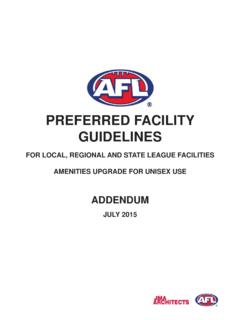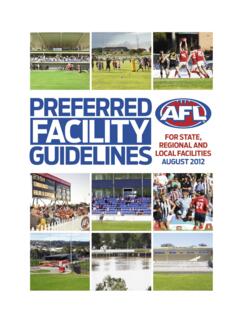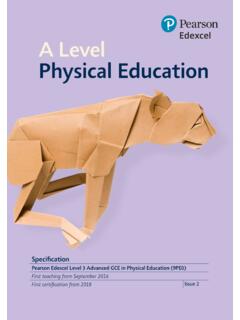Transcription of VOLUNTEER MANAGEMENT - AFL Community Club
1 Club MANAGEMENT programVOLUNTEER MANAGEMENTFOR FOOTBALL CLUBSP ublished by the Australian Football Manager AFL Game Development: David MatthewsCommunity Development Manager: Ed BiggsNational Community Relations Coordinator: Kirsten BirchContent MANAGEMENT : Kirsten BirchDesign and publishing: Roslyn Jeffs AFL PublishingIllustrations: Dennis MillerPrinted by: Condor Printing The Australian Football League acknowledges the signifi cant fi nancial support from the Australian Sports Commission for this resource of the information included in this resource has been reproduced or modifi ed from the resources published by the Australian Sports club development project group:Ed Biggs, Kirsten Birch, Mick Daniher, Peter Hanlon, Colin Lane, David Matthews, Mike O Meara, Graeme Murphy, David Shilbury, Ross Smith, Dean Warren, Lawrie acknowledgement to the following for their contribution:Ross Allen, Eric Bott, Grant Burgess, John Cutler, Peter Di Sisto, Michelle Donat, Cherie Fraser, Quinton Gleeson, Anton Grbac, Peter Harley, Rod Hughes, Roslyn Jeffs, Fiona Macmillan, Annette Maher, Shelley Maher, Paul Matton, Peter McDougall, Paul Milo, Wes Mudge, Rod Nicholson, Tania O Day, Adrian Panozzo, Hayden Park, Peter Quigley, Trevor Robertson, Julianne Rose, Kevin Sheehan, Martin Shields, Bernard Slattery, Bruce Stephens, Mark Stone, John Strachan, Steve Teakel, Kathy Tessier, Clare Toia-Bailey, Rob Veale, Brian Walsh, Bruce 2004 Australian Football LeagueThis information has been prepared by and on behalf of the Australian Football League (AFL) for the purpose of general information.
2 Although the AFL has taken care in its preparation, any person or entity should use this information as a guide only and should obtain appropriate professional advice if required. The AFL does not accept any liability or responsibility for any resulting loss suffered by any reader except where liability cannot be excluded under MANAGEMENT program3 VOLUNTEER MANAGEMENT FOR FOOTBALL CLUBSW elcome to the AFL club MANAGEMENT programThe Australian Football League recognises that club volunteers and administrators make a signifi cant contribution to Australian Football. It also recognises that the demands on club volunteers and administrators are increasing along with the need for clubs to operate in a professional a result, the AFL, in conjunction with the Australian Sports Commission, has developed the AFL club MANAGEMENT program aimed at supporting Community football through providing an education program for club administrators.
3 Community football clubs and leagues form the cornerstone of the AFL game and the support of Community club football is a critical component to the overall success of the competition at all AFL club MANAGEMENT modules have been developed through extensive consultation with volunteers and administrators and the six modules have been identifi ed as the main priority areas of assistance required by Community module of the AFL club MANAGEMENT program has been designed as a stand-alone workshop/ seminar to allow for clubs members to attend the workshops that are particularly relevant to their role within the club or their own the six modules are designed to be stand-alone, it is important to recognise that the planning module is the foundation upon which club MANAGEMENT is based. Therefore all club members are encouraged to participate in the planning module and, ultimately the club s overall planning encourage you to attend and be part of all workshops offered through your local league/association and in the process help better your club and grow Community club wish you all the best in these DemetriouChief Executive Offi cerAustralian Football League4 AFL club MANAGEMENT programContentsAFL club MANAGEMENT program.
4 5 Introduction .. 6 What defi nes a VOLUNTEER ? .. 7 Why do people VOLUNTEER ? .. 8 Rights and responsibilities of volunteers .. 10 Codes of practice .. 11A code of practice for volunteers .. 11 The VOLUNTEER coordinator - the key to success .. 12 The starting point for the VOLUNTEER coordinator .. 13 Job descriptions .. 16 The job description .. 16 Review of the job description .. 16 Finding volunteers .. 17 Recruitment ideas .. 18 Selecting and screening volunteers .. 20 Selecting volunteers .. 20 Screening volunteers .. 21 Matching the VOLUNTEER to the job .. 22 Orientation and training for volunteers .. 24 Orientation for volunteers .. 24 Training for volunteers .. 24 Evaluating training programs .. 26 Recognising and rewarding volunteers .. 27 Considerations for VOLUNTEER recognition .. 28 Developing organisational commitment .. 29 Managing and supporting volunteers .. 30 Being part of the team encouraging loyalty .. 30 Volunteers managing volunteers.
5 30 Volunteers and paid staff .. 31 Dealing with confl ict and diffi cult volunteers .. 32 Confl ict MANAGEMENT .. 32 Dealing with diffi cult volunteers .. 33 Dismissing a VOLUNTEER .. 33 Developing a VOLUNTEER MANAGEMENT policy .. 34 VOLUNTEER MANAGEMENT policy areas .. 34 Succession planning .. 37 Don t let it all fade away planning for next year .. 37 What makes a good succession plan? .. 37 Apprenticeships, traineeships and mentoring programs .. 38 Future of volunteering .. 41 How does your club rate? .. 42 Conclusion .. 43 Glossary .. 44 References .. 45 Further references .. 46 Further information .. 46 Appendices .. 475 VOLUNTEER MANAGEMENT FOR FOOTBALL CLUBSAFL club MANAGEMENT programThe AFL club MANAGEMENT program consists of the following modules:Planning The purpose of this module is to: Identify the need for clubs to plan. Provide the basic framework for organising a planning workshop. Outline the planning process and the 10 basic stages involved.
6 Provide practical templates to assist in writing a plan. Identify methods of reviewing the effectiveness of the MANAGEMENT The purpose of this module is to introduce: The application of specifi c legal principles in the football environment. Considerations relevant to liability and duty of care. The risk MANAGEMENT process. Waivers, indemnities and warnings. Risk MANAGEMENT policies and procedures. Legislative requirements. Insurance National Risk Protection Program. Match-day checklists. The importance of establishing a risk MANAGEMENT offi MANAGEMENT The purpose of this module is to: Outline the rights and responsibilities of volunteers. Encourage clubs to appoint a VOLUNTEER coordinator. Outline the importance of job descriptions. Identify ways to recruit, retain and recognise volunteers. Identify how to develop a VOLUNTEER MANAGEMENT policy. Outline the process of selecting and screening volunteers.
7 Identify the need for succession partnerships The purpose of this module is to: Explore the ways in which a Community club can build relationships with other sports and groups within the Community . Identify how clubs can form favourable partnerships with local government authorities. Develop ways of attracting sponsorship and fundraising opportunities. Show ways of obtaining grants and funding from various agencies local, state and federal level. Establish how to create a healthy environment within the club. Identify how to attract and support umpires. Provide ways clubs can promote their activities within the MANAGEMENT The purpose of this module is to: Explore the roles and responsibilities of the treasurer within a football club. Outline the processes involved in and the issues that should be addressed when considering the fi nancial MANAGEMENT of a football club. Provide information that will assist the club treasurer in fulfi lling his/her role with regard to the fi nancial MANAGEMENT of a development The purpose of this module is to: Develop an understanding of AFL Game Development structure and philosophy.
8 Provide an understanding of the underpinning principles at each level of the participation pathway with a focus on AFL Auskick, youth football, recreational football, female football and children with disabilities. Identify the responsibilities of clubs and AFL Auskick centres in relation to the organisation of junior programs and competitions. Outline the coaching and umpiring support and resources available for all levels of Australian football. Identify the value in developing club links with AFL Auskick centres, schools and the Community . Indicate ways of recruiting and retaining children and parents in junior development programs. Highlight the importance of developing a quality club club MANAGEMENT programIntroductionCommunity club football is the heart of Australian Football. Quality volunteers are critical to the conduct and growth of the game because they determine the quality of the club environment and, hence, the experience for players and their are the glue that holds together every football club in Australia.
9 They dedicate hours of time and energy every year, working in a variety of ways and completing many necessary tasks. Without the dedication of these volunteers, football clubs as we know them would not exist. Community football continues to thrive through the efforts of purpose of this module is to: Outline the rights and responsibilities of volunteers. Encourage clubs to appoint a VOLUNTEER coordinator. Outline the importance of job descriptions. Identify ways to recruit new volunteers. Outline the process of selecting and screening volunteers. Identify how to develop a VOLUNTEER MANAGEMENT policy. Explain the importance of recognising and rewarding volunteers. Identify the need for succession Facts: About million adults VOLUNTEER in Australian sport and recreation. This voluntary contribution to Australian sport and recreation is worth more than $2 billion annually. Without volunteers, each Australian household s expenditure on sport and recreation would increase by $330 a year.
10 Volunteers perform 80 per cent of administration in sport and recreation. Volunteers contribute in excess of 165 million hours per year to running sport and recreation clubs and organisations. More than 50 per cent of volunteers are aged 30 to 50. 41 per cent of all volunteers are found in sport and recreation. The proportion of Australians who do VOLUNTEER work is 32 per cent. The average person helps out on average hours per week. (Source: Street Ryan & Associates, Economic Impact 2000 of Australian Sport)7 VOLUNTEER MANAGEMENT FOR FOOTBALL CLUBSWhat defi nes a VOLUNTEER ?Volunteers are representatives from the Community who freely choose to give their time and skills to support club activities for no payment other than reimbursement for out of pocket expenses. Volunteers come from all age groups, educational backgrounds and genders. Almost everyone can be looked upon as a potential VOLUNTEER to your football club. You only have to look at your own club to realise that all sorts of people VOLUNTEER young people, retirees, grandparents, school students, mothers and fathers.







